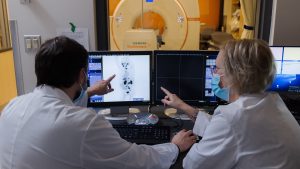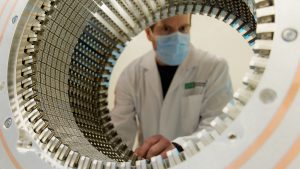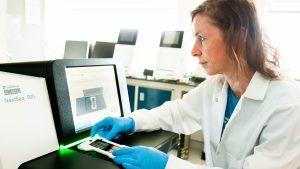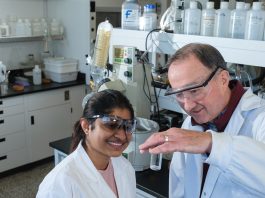The mission of the Université de Sherbrooke Cancer Research Institute (IRCUS) is to develop synergistic and innovative interdisciplinary research to reduce the impact of cancer on affected people. Everything is in place to make it happen.
To understand, detect and treat a disease as complex as cancer, it makes sense to combine different areas of expertise. It is essential to study cancer comprehensively to achieve major advances in oncology. This is the reason why IRCUS members join forces to study the disease from every angle.
With diverse and complementary backgrounds ranging from basic research to patient treatment, IRCUS brings together more than 100 researchers from a variety of disciplines, working to better understand, detect and monitor cancer; develop innovative and effective treatments; and help physicians provide the best care for patients.
A research vision that accelerates breakthroughs and optimises investments
Teams at IRCUS are studying a number of areas of research, including RNA and protein biology, epithelial cancers and biological models, and diagnostic and therapeutic approaches, from a molecular, cellular, pharmacological, clinical, psychosocial and legal perspective. The areas of research are interrelated, so the fields of expertise are shared, as well as techniques, state-of-the-art equipment, data and approaches from different research phases.
Professor Jean-Pierre Perreault, Vice-President, Research and Graduate Studies, said: “At the Université de Sherbrooke, our approach to university research combines a culture of partnership and collaboration, shared infrastructure, and an interdisciplinary vision.
“With this approach in mind, our cancer research institute provides teams with innovative ways of collaborating and supports their efforts by strategically investing in infrastructure, providing easy access to state-of-the-art facilities and technologies, research platforms, data and resources, and stimulating multidisciplinary collaboration. It translates into accelerated project implementation and optimised investment by partners and donors.”
A continuum that drives innovation within the healthcare system
The cross-functional expertise at IRCUS is also evident in its proximity to the Faculty of Medicine and Health Sciences, as well as the university hospital affiliation.

Professor François-Michel Boisvert, Scientific Director of the Institute, said: “A clinical research centre and a molecular imaging centre complete this highly collaborative and agile ecosystem, which facilitates the launch and implementation of large-scale interdisciplinary projects. Hundreds of students, postdoctoral fellows, residents, professionals, patient-partners and members of the nursing staff (healthcare professionals) collaborate in our researchers’ work.”
This continuum enables IRCUS to validate discoveries quickly and propels innovation forward, resulting in their integration into the healthcare system, benefiting people affected by cancer.
Significant advances thanks to interdisciplinary networks
There are many scientific breakthroughs by teams at IRCUS, particularly in the field of cancer detection, where a number of the Institute’s researchers and collaborators are attracting the attention of major organisations and research groups.
A new bladder cancer detection test that uses biomarkers in urine to detect the disease more quickly and less invasively is one example. The highly marketable test designed by a team with expertise in medicine, biochemistry, cell biology, mathematics and the Université de Sherbrooke’s Proteomics research platform could save many lives. The World Health Organization decided to collaborate with the Université de Sherbrooke to make the test usable and available to all population groups.
Our cutting-edge expertise in magnetic resonance imaging (MRI), neurosurgery and neuro-oncology, as well as in artificial intelligence (AI) and health, has been harnessed in a major study, leading to a significant breakthrough in the understanding and treatment of glioblastoma – a rare and highly aggressive form of brain cancer. The project also led to an unprecedented breakthrough in the field: Federated Learning analysis of over 25,000 MRI results, leading to a 33% increase in the tumour boundary detection rate. The algorithm developed in this study enables the profiling of three very precise tumour sub-regions. Identifying a tumour’s boundaries is an essential step, because treatment depends on the precision with which a tumour is detected and categorised. Identifying a tumour’s boundaries more accurately accelerates the treatment process.

These are just a few examples from a variety of innovative projects developed by major collaborations between our teams.
Our cutting-edge research platforms at the centre of major projects
The Université de Sherbrooke believes that combining expertise and research infrastructures, through technology platforms, is the most effective way to make cutting-edge research accessible to the research community and industry. They are essential for developing partnerships with other research centres, industrial partners and institutions, both in Canada and abroad.

For example, our RNomics Platform (transcriptome analysis) offers a wide range of sequencing services specialised in RNA variant detection and high-throughput screening. The platform processes over five million PCR reactions for research teams worldwide and is the source of the world’s first high-throughput direct PCR screening for splice variants. It has contributed to the discovery of splice variants on biomarkers of breast and ovarian cancer. Furthermore, it has managed and carried out several large-scale projects for major Canadian grant agencies, such as Genome Canada and the Canada Foundation for Innovation.
Our expertise, interdisciplinary vision, research platforms and integrated approach are interrelated and make the Université de Sherbrooke and IRCUS the ideal partnership in the fight against cancer.
For more information or to discuss partnering with our innovative university, please contact us at research@usherbrooke.ca.
Please note, this article will also appear in the 20th edition of our quarterly publication.








